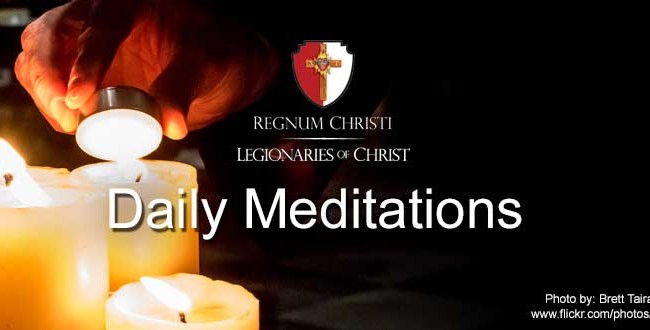June 24, 2015 – What’s in a Name?
Solemnity of the Nativity of John the Baptist
By Father Edward McIlmail, LC
Luke 1:57-66, 80
When the time arrived for Elizabeth to have her child she gave birth to a son. Her neighbors and relatives heard that the Lord had shown his great mercy toward her, and they rejoiced with her. When they came on the eighth day to circumcise the child, they were going to call him Zechariah after his father, but his mother said in reply, “No. He will be called John.” But they answered her, “There is no one among your relatives who has this name.” So they made signs, asking his father what he wished him to be called. He asked for a tablet and wrote, “John is his name,” and all were amazed. Immediately his mouth was opened, his tongue freed, and he spoke blessing God. Then fear came upon all their neighbors, and all these matters were discussed throughout the hill country of Judea. All who heard these things took them to heart, saying, “What, then, will this child be?” For surely the hand of the Lord was with him. The child grew and became strong in spirit, and he was in the desert until the day of his manifestation to Israel.
Introductory Prayer: Lord, I make this effort at prayer for the sake of my soul and the souls of my loved ones. I believe that you died for us and want us to be with you forever in heaven.
Petition: Grant me new respect, Lord, for parents.
1. Bundle of Joy: The arrival of a new baby has been a source of joy throughout the ages. Babies are God’s way of saying the world should go on. Each new child reflects a facet of the infinite beauty and mystery of God. And by teaching us patience and selflessness, the little ones help us grow in holiness. In their childlike simplicity they teach us to remain simple. Their neediness can, and should, soften our hearts. They don’t even have to be our own children; we can feel an obligation to help all kids, since their lives enrich all of us. What have I done lately to help the little ones, born and unborn? Is there a crisis-pregnancy center that could use help? Have I spoken well of parents who are open to large families?
2. God’s Choice: For the ancient Jews a name captured, even defined, a person’s identity. So for Elizabeth to name her son “John” was significant. It showed her recognition of God’s great plan for the child. John was in the Almighty’s special care from the start. Even today, each and every child is loved by God and has a destiny in the heavenly Father’s plan. Each has a vocation, a calling, in the Church. Do I appreciate the role that little ones have in God’s plans? Do I respect their dignity? Or do I try to impose my prejudices on them? They are tomorrow’s adults. How will I want them to remember my example?
3. Loosened Lips: Zechariah had doubted God and was struck mute. He regains his speech only after publicly accepting God’s plan and allowing his newborn son to take the name John. We, too, might have a bit of Zechariah in us. We resist God, only to hit a dead end. Bad friendships, habits of serious sin, rising despair – all of these can eat away at us. Yet, repentance is slow to come. Why? “We think that evil is basically good,” said Pope-Emeritus Benedict XVI (December 8, 2005). “We think that we need it, at least a little, in order to experience the fullness of being. … If we look, however, at the world that surrounds us we can see that this is not so; in other words, that evil is always poisonous, does not uplift human beings, but degrades and humiliates them.” Am I resisting God’s plans?
Conversation with Christ: Lord, you have put family members and other loved ones in my life for a reason. I’m to help them get to heaven, and they are to help me do the same. Remind me of this truth, and help me in a special way not to interfere with the plans you have for the children in my life.
Resolution: I will pray a decade of the rosary that all my family members reach heaven.

